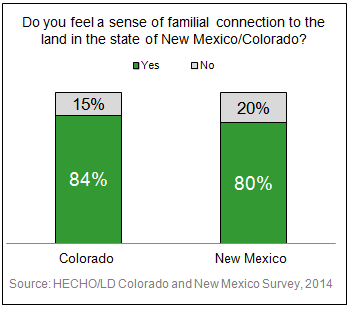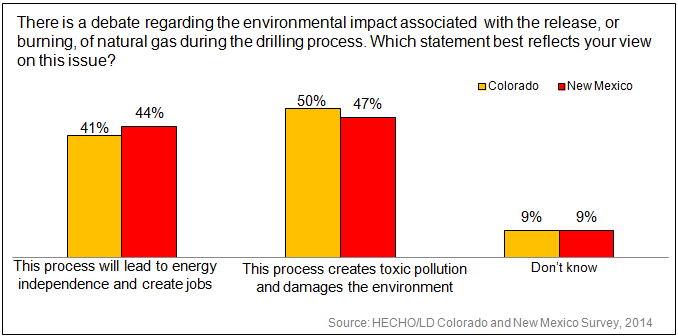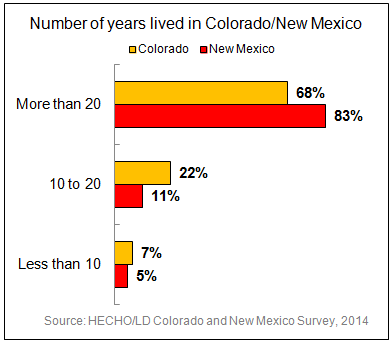Last week Latino Decisions released results from a poll sponsored by Hispanics Enjoying Camping Hunting and Outdoors (HECHO), an organization dedicated to preserving America’s public lands that focused on the value Latinos place in protecting public lands. TOPLINES HERE and PRESENTATION SLIDE DECK HERE
The survey was conducted in Colorado and New Mexico, two states where the Latino electorates are vital to election outcomes, and where there has been an increase in tensions between preservation of land and oil and gas development. This post draws upon the polling data to highlight the way personal and familial connection to place influences the way the Hispanic population in these states relates to land conservation.
Hispanic Influence in Colorado and New Mexico
Hispanic voters in both New Mexico and Colorado have a lot of say in who is elected to office in these states. New Mexico is the state where Hispanic voters have the greatest political influence in the nation. For example, in 2012 Latinos accounted for 37% of the electorate in New Mexico, which represents the highest proportion of Latino voters compared to all other U.S. states. The political prowess of Hispanics in New Mexico is due in large part to a greater ratio of eligible voters within the overall Latino population in the state than any other border region state. Although Latinos make up a relatively smaller percentage of the electorate in Colorado relative to New Mexico, Hispanic influence in Colorado is high as a result of the competitiveness of the state politically. Hispanics are a core component that maintains Colorado’s battleground status.
Strong Ties to Land in these States Drives Attitudes
One of the clear story lines that emerged from the data was that the vast majority of Hispanic New Mexicans and Coloradans have strong familial connections to the land that goes back multiple generations. This relationship to the territory for many Hispanic families in these states goes back to the 1600s, well before Mexico or the United States were independent nations. As a result, these communities have been an integral part of the political system of their colony, their territory, and eventually their state for approximately 400 years!
This historical context reflected strongly in the polling numbers. As shown in the figure below, a robust 80% of the Hispanic population surveyed in New Mexico and 84% in Colorado responded that they “feel a familial connection to the land in their state.”

Furthermore, 83% of the Hispanic electorate in New Mexico and 68% in Colorado indicated they have lived in their home state for 20 or more years. This deep and personal connection to the land provides context for many of the survey findings, where strong favor for land conservation is not associated with partisanship or ideology, but rather familial ties and a sense of place that is enduring unlikely to wane over time.
There is overwhelming consensus among Hispanics in these two Western states when it comes to conservation and resource issues. For example, 73% of Hispanics in New Mexico believe it is “very important” for government to preserve and protect public lands and open spaces for family recreation and the overall well-being of the environment. Among those with strong family ties to the region, the share that thinks it is “very important” increases to 81%. For those without strong regional ties, 66% feel the same way. It is true that the clear majority of Hispanics in Colorado and New Mexico support government protection of open spaces and public land, those with deeper roots have pronounced attitudes on the issue.

A similar pattern emerges on the matter of environmental impacts of the natural gas drilling process. When asked to indicate whether they identify more strongly with a view that the process will “lead to energy independence and create jobs” or alternatively, “create toxic pollution and damage the environment”, 49% of the overall sample sides with the statement focused on damage to the environment compared to 42% who identify more strongly with the job growth and energy independence side of this debate. There is little variation between the two states on this issue, with only a 3% difference between Hispanics in Colorado and New Mexico.
When we consider differences between those with and without strong familial ties to the region, marked differences occur. The majority of Hispanic voters with strong ties to Colorado and New Mexico, 52%, believe the drilling process is bad for the environment compared to only 36% among those without strong familial ties that are strong and binding.
Although the historical context of Hispanic political influence in Colorado and New Mexico is somewhat unique, the relationship we find between familial connections to land and attitudes toward conservation policy are likely to exist elsewhere. For example, Latinos have had a strong presence throughout the histories of a number of other states, including Texas and California. The findings of this poll provide unique insight for those interested Hispanic views regarding land preservation hold in other locales.
Methodology: Latino Decisions interviewed 400 Latino registered voters from May 27 through June 10, 2014. A blended sample of landline telephones, cell phones, and the Latino Decisions online web panel was used. Interviews were conducted in English or Spanish, at their discretion by fully bilingual interviewers. The poll carries a margin of error of +/-4.9%. TOPLINES HERE and PRESENTATION SLIDE DECK HERE



